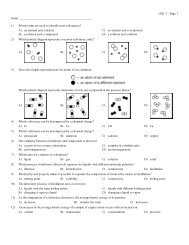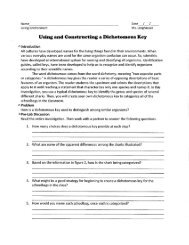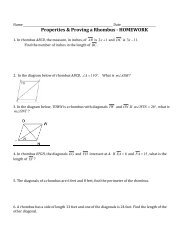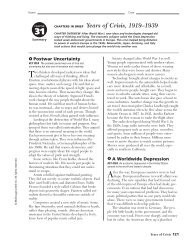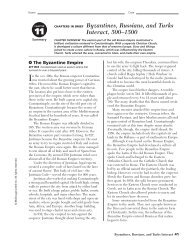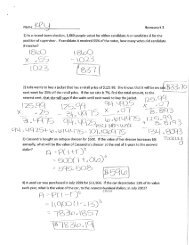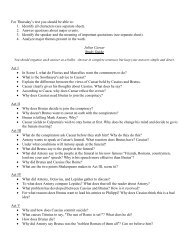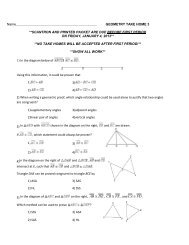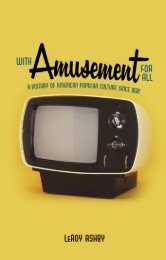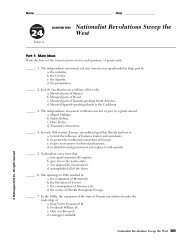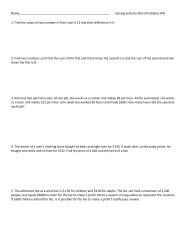Pride Christmas 2012 - St. Dominic High School
Pride Christmas 2012 - St. Dominic High School
Pride Christmas 2012 - St. Dominic High School
- No tags were found...
Create successful ePaper yourself
Turn your PDF publications into a flip-book with our unique Google optimized e-Paper software.
<strong>Christmas</strong> <strong>2012</strong>ALUMNI in the NEWSDonald “Taps” Gallagher (‘72) fulfills a40-year goal with his book, <strong>St</strong>olen GloryWritten by Elaine Doremus Slayton. “His Basket List.”Hinsdale Living Magazine <strong>2012</strong>: 46-48. Print.<strong>St</strong>olen Glory, a nonfiction book written byClarendon Hills attorney Donald “Taps”Gallagher, with co-author Mike Brewster,chronicles the last harrowing seconds ofthe gold medal game at the 1972 MunichSummer Olympic Games that changedhistory—and inspired Taps to a goal he isachieving 40 years after that fateful game.We all remember exactly where we wereand what we were thinking on significantdays in history, including pivotal Olympicmoments. I still recall the thrill of sittingin my best friend’s air-conditioned familyroom on a hot summer day in 1976 whenNadia Comaneci received the first everperfect “10” score in an Olympic gymnasticevent.During the 1972 Summer Olympic Games inMunich, Donald “Taps” Gallagher had justgraduated high school in Long Island, NewYork, and was preparing to go off to collegeat Saint Mary’s University in Halifax, whenhe watched the gold medal basketball gamebetween the Soviet Union and the United<strong>St</strong>ates that made a lasting imprint on him.“History tells us that the Soviet Union beatthe United <strong>St</strong>ates 51–50 in that Olympicgame on a last-second basket at the finalbuzzer,” says Taps. But he and many othersstill believe that the Soviets didn’t win.“When I watched the game and whathappened at the end, I [promised] myselfthat if I ever became a lawyer, I wouldwrite a book about the game,” says Taps.“I’ve always had a passion and sense ofhistory for the game.” At 6 feet, 7 inches,Taps played basketball in high school andcollege and coached teams including theChicago Blaze and his daughters’ youthteams. A lifelong and dedicated fan of theNew York Knicks, he has rubbed elbowswith basketball icons including MichaelJordan. As a young man, Taps caddied forthe late Ralph Kaplowitz, who played forthe New York Knicks starting lineup in thevery first game of NBA/BAA history. Ralphgave Taps his old basketball sneakers whenhe was done with them.Now, Taps is champion of a movementto convince the International OlympicCommittee (IOC) to retroactively awardduplicate gold medals to the Americanteam. This has only been done once beforein history, when the IOC awarded duplicategold medals to the Canadian pairs figureskaters at the 2002 Winter Games in SaltLake City.In the prologue of the book, Taps recountsthe ending:With three seconds remaining in the game, theUnited <strong>St</strong>ates team was down by one point whenplayer Doug Collins (currently coach of thePhiladelphia 76ers of the NBA) stood at the freethrow line after having been knocked out cold ina foul by the Soviets. Through his haze, Collinsmade the two free throws to put the U.S. ahead,50–49. But after the Soviets’ first unsuccessfulattempt at scoring during the last three ticksof the clock, they were given another chance toinbound, due to reasons still disputed to thisday. The Soviets missed that shot, and ABCgame announcer Frank Gifford announced thatthe U.S. had completed an unlikely comeback.Fans surged onto the court and the U.S. teamcelebrated. The game was over, or so theythought.That’s when R. William Jones, President ofFIBA, the International Basketball Federation,ordered that the Soviets be given a third chanceto take the ball out of bounds. This time, Sovietplayer Alexander Belov leapt high in the air,shed two U.S. defenders on either side, andsimply laid the ball in the basket, uncontested.The Soviet players were wild, rolling on thefloor and hugging one another, their coaches andtrainers, and drinking from bottles of vodka thathad appeared out of nowhere.In the chaotic U.S. locker room, thebewildered and stunned United <strong>St</strong>ates teamvoted to refuse their silver medals. Olympicrules state that unless all team membersaccept their medals, none of the individualmembers can.“Nearly 40 years to the day of the game, 12silver medals lay unclaimed in an OlympicMuseum storage facility in Lausanne,Switzerland. History says those medalsbelong to the Americans,” says Taps.In 2008, Taps decided it was time to writethe book. “I would only write it if all 12players agreed,” says Taps. “I woke up inthe middle of the night and the title, <strong>St</strong>olenGlory, came to me.” As part of his research,he interviewed many people close to thesport—players, announcers, and coaches—including Frank Gifford.“So while the book is indeed about that40-minute basketball game so long agoand all its Cold War and basketball worldbuildup, it’s also about an agonizingchoice made in the aftermath by 12 youngmen, none over the age of 23, and howthat decision has reverberated through theyears.”“It’s a history book appropriate for kidsfrom the sixth grade through adults,” saysTaps. Beginning with the period from 1970,with the Cold War as a backdrop, it was thebirth of international basketball—in 1972,there had not yet been any internationalplayers in the NBA. It raises the issue ofsportsmanship from different viewpoints,including whether or not the United <strong>St</strong>atesteam should have accepted the silvermedals. “If people read it, they’ll reallyenjoy it,” says Taps. “There are a lot ofanecdotes from players about what goes onbehind the scenes in basketball, includingthe politics behind how teams are picked.”Taps is hoping to convince the IOC to awardduplicate gold medals to the United <strong>St</strong>atesin time for the team’s “Courage in Munich”reunion scheduled for next month, nearly40 years from that fateful day. He’s filedappeals with FIBA and the InternationalCourt of Arbitration asking for the case tobe tried in Lausanne, the only body that canoverrule the IOC.Is it a long shot? Perhaps, but Taps has totake this one all the way to the end. Hisoldest daughter, Glynis, recently said tohim, “If you get them the medals, you will dosomething that very few people do —changehistory.”Taps intends to do just that, and to convey themessage to young people: “Don’t let anyoneever tell you that you can’t do something.Accept the challenge. Regardless of whetheryou win or lose, you tried.”“My greatest moment would be to get theteam duplicate gold medals,” says Taps.6PRIDE | Saint <strong>Dominic</strong> Newsletter



